RSCH-8110: Analyzing the Role of Theory in Research - Social Cognition
VerifiedAdded on 2022/09/15
|7
|1215
|23
Essay
AI Summary
This paper explores the role of theory in research, focusing on Social Cognitive Theory (SCT) and its application. It discusses how theories provide direction and understanding, broadening the scope of research. The paper delves into the key components of SCT, such as self-efficacy and behavioral capability, and examines Dr. Burkholder’s comparison of knowledge and learning. Furthermore, it analyzes the epistemological and ontological aspects of the social ecological model, highlighting its relational and descriptive properties. The essay also touches upon the role of Artificial Intelligence and justification of AI, concluding that theory and philosophy are interlinked, influencing individual actions and perceptions. The document references research to support its claims.
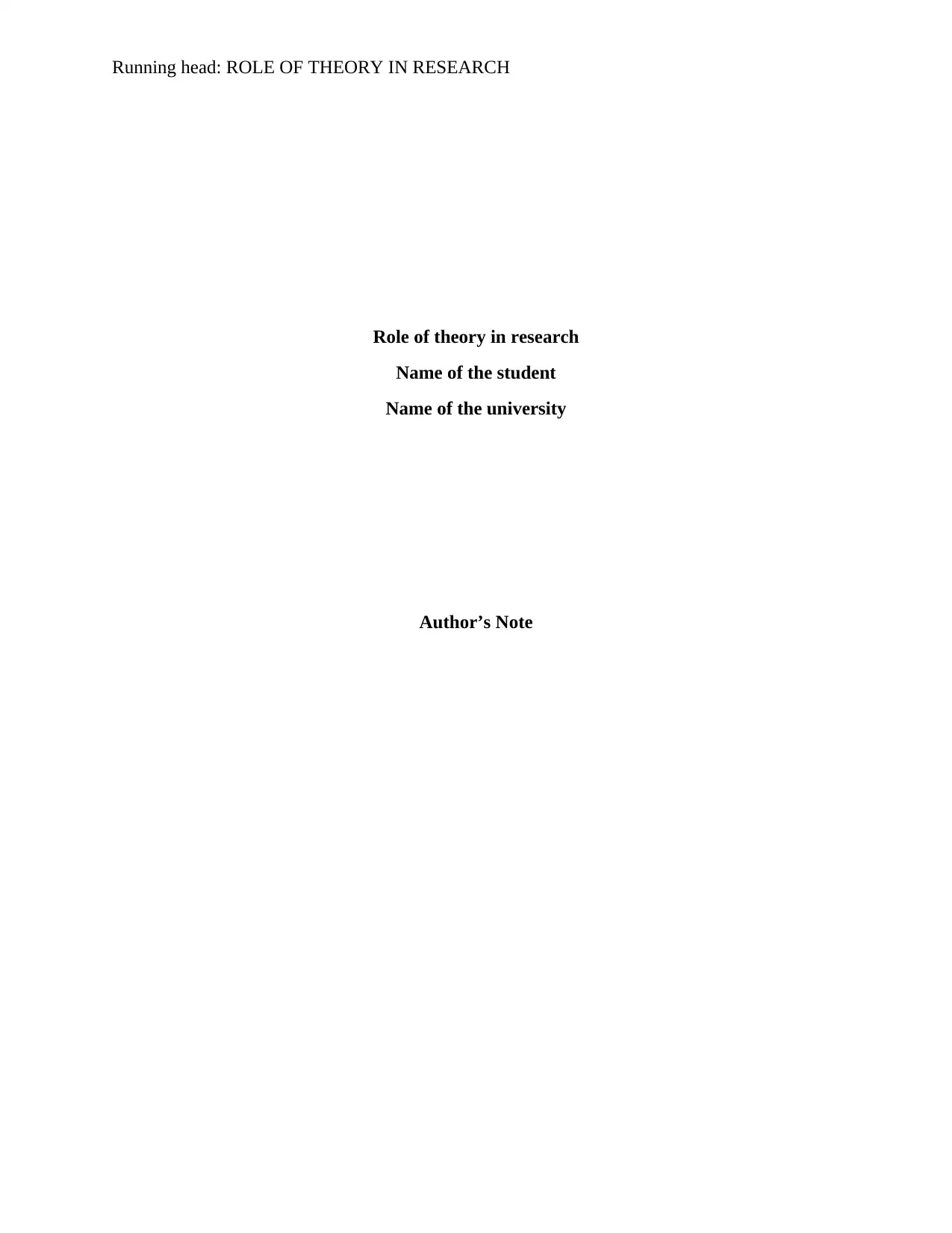
Running head: ROLE OF THEORY IN RESEARCH
Role of theory in research
Name of the student
Name of the university
Author’s Note
Role of theory in research
Name of the student
Name of the university
Author’s Note
Paraphrase This Document
Need a fresh take? Get an instant paraphrase of this document with our AI Paraphraser
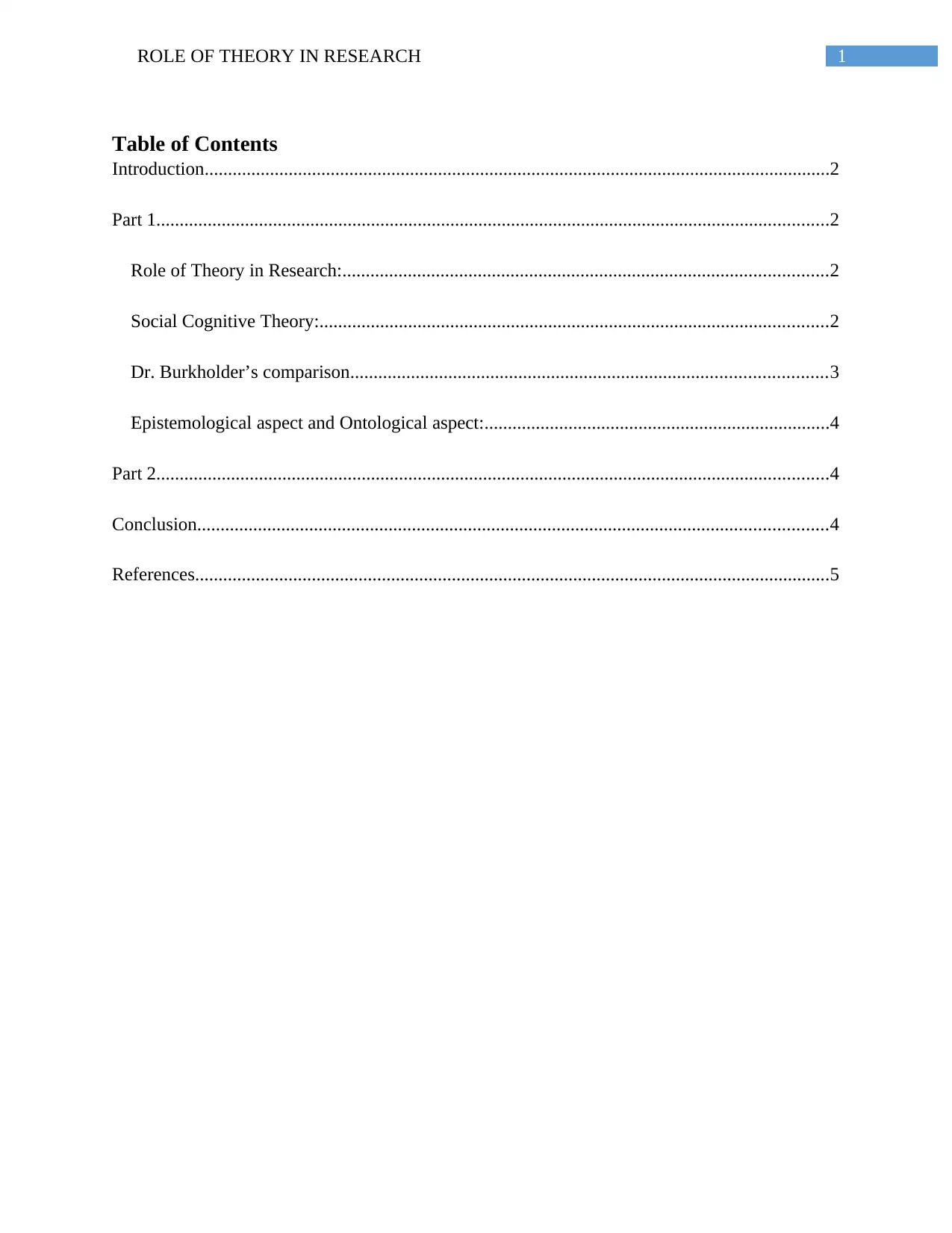
1ROLE OF THEORY IN RESEARCH
Table of Contents
Introduction......................................................................................................................................2
Part 1................................................................................................................................................2
Role of Theory in Research:........................................................................................................2
Social Cognitive Theory:.............................................................................................................2
Dr. Burkholder’s comparison......................................................................................................3
Epistemological aspect and Ontological aspect:..........................................................................4
Part 2................................................................................................................................................4
Conclusion.......................................................................................................................................4
References........................................................................................................................................5
Table of Contents
Introduction......................................................................................................................................2
Part 1................................................................................................................................................2
Role of Theory in Research:........................................................................................................2
Social Cognitive Theory:.............................................................................................................2
Dr. Burkholder’s comparison......................................................................................................3
Epistemological aspect and Ontological aspect:..........................................................................4
Part 2................................................................................................................................................4
Conclusion.......................................................................................................................................4
References........................................................................................................................................5
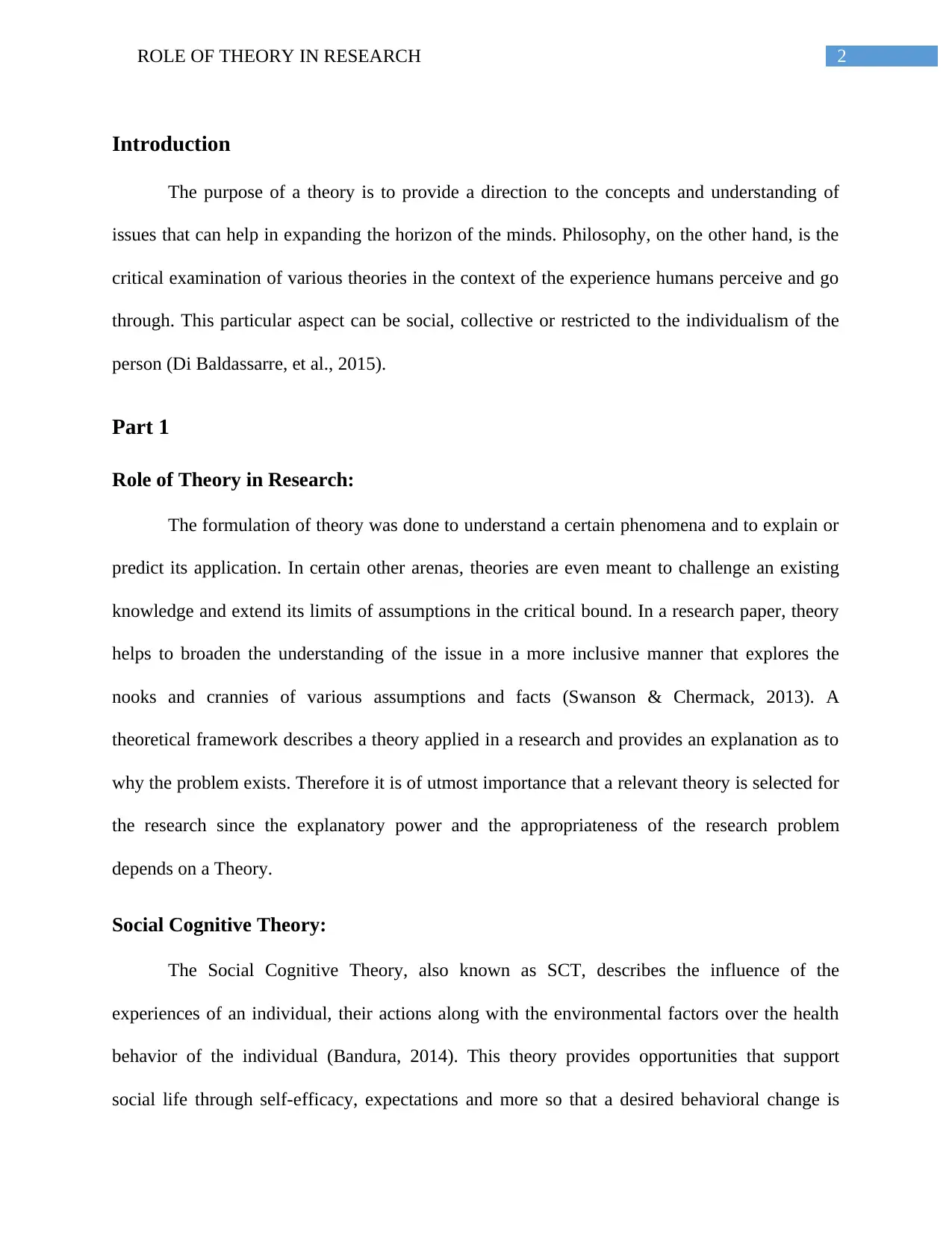
2ROLE OF THEORY IN RESEARCH
Introduction
The purpose of a theory is to provide a direction to the concepts and understanding of
issues that can help in expanding the horizon of the minds. Philosophy, on the other hand, is the
critical examination of various theories in the context of the experience humans perceive and go
through. This particular aspect can be social, collective or restricted to the individualism of the
person (Di Baldassarre, et al., 2015).
Part 1
Role of Theory in Research:
The formulation of theory was done to understand a certain phenomena and to explain or
predict its application. In certain other arenas, theories are even meant to challenge an existing
knowledge and extend its limits of assumptions in the critical bound. In a research paper, theory
helps to broaden the understanding of the issue in a more inclusive manner that explores the
nooks and crannies of various assumptions and facts (Swanson & Chermack, 2013). A
theoretical framework describes a theory applied in a research and provides an explanation as to
why the problem exists. Therefore it is of utmost importance that a relevant theory is selected for
the research since the explanatory power and the appropriateness of the research problem
depends on a Theory.
Social Cognitive Theory:
The Social Cognitive Theory, also known as SCT, describes the influence of the
experiences of an individual, their actions along with the environmental factors over the health
behavior of the individual (Bandura, 2014). This theory provides opportunities that support
social life through self-efficacy, expectations and more so that a desired behavioral change is
Introduction
The purpose of a theory is to provide a direction to the concepts and understanding of
issues that can help in expanding the horizon of the minds. Philosophy, on the other hand, is the
critical examination of various theories in the context of the experience humans perceive and go
through. This particular aspect can be social, collective or restricted to the individualism of the
person (Di Baldassarre, et al., 2015).
Part 1
Role of Theory in Research:
The formulation of theory was done to understand a certain phenomena and to explain or
predict its application. In certain other arenas, theories are even meant to challenge an existing
knowledge and extend its limits of assumptions in the critical bound. In a research paper, theory
helps to broaden the understanding of the issue in a more inclusive manner that explores the
nooks and crannies of various assumptions and facts (Swanson & Chermack, 2013). A
theoretical framework describes a theory applied in a research and provides an explanation as to
why the problem exists. Therefore it is of utmost importance that a relevant theory is selected for
the research since the explanatory power and the appropriateness of the research problem
depends on a Theory.
Social Cognitive Theory:
The Social Cognitive Theory, also known as SCT, describes the influence of the
experiences of an individual, their actions along with the environmental factors over the health
behavior of the individual (Bandura, 2014). This theory provides opportunities that support
social life through self-efficacy, expectations and more so that a desired behavioral change is
⊘ This is a preview!⊘
Do you want full access?
Subscribe today to unlock all pages.

Trusted by 1+ million students worldwide
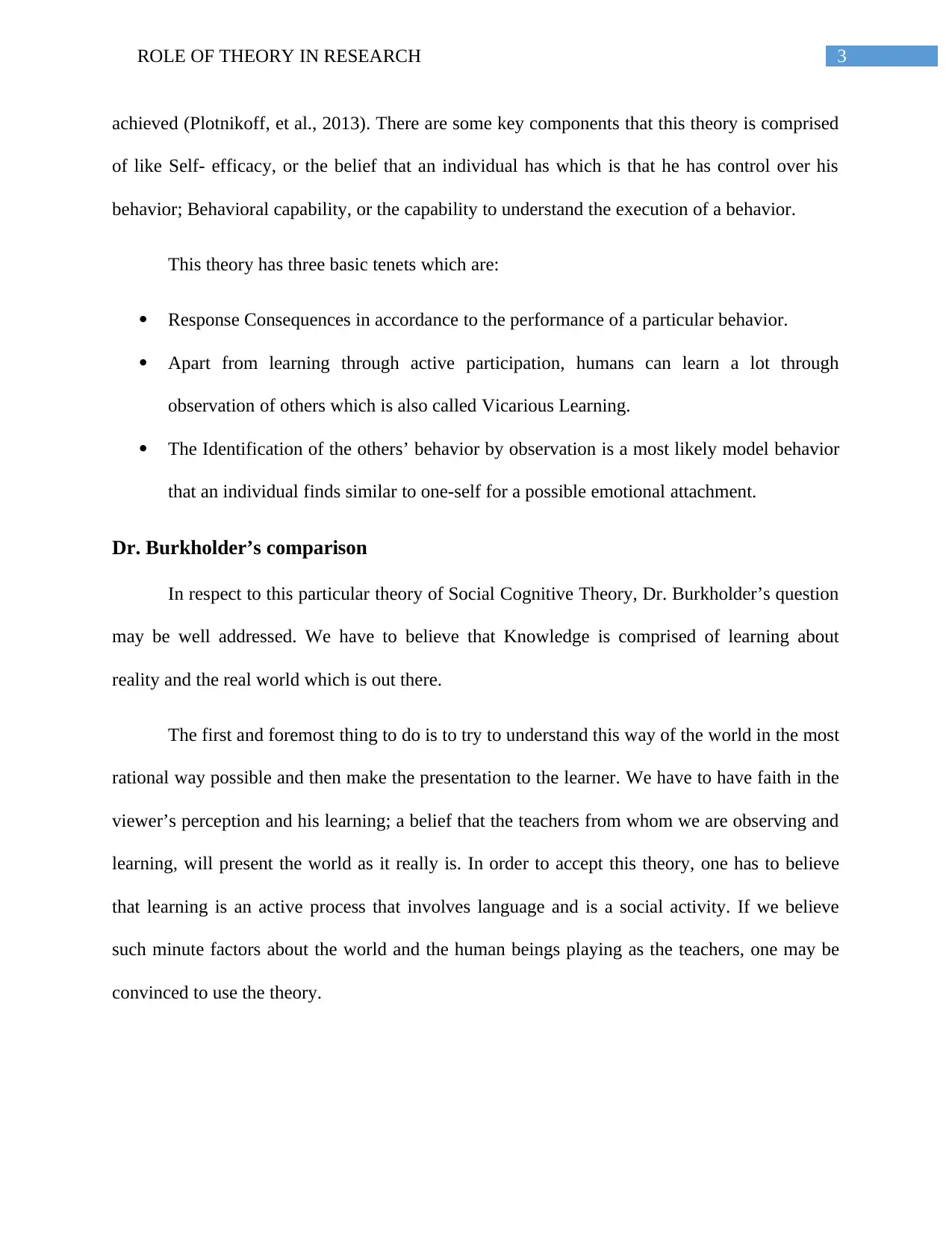
3ROLE OF THEORY IN RESEARCH
achieved (Plotnikoff, et al., 2013). There are some key components that this theory is comprised
of like Self- efficacy, or the belief that an individual has which is that he has control over his
behavior; Behavioral capability, or the capability to understand the execution of a behavior.
This theory has three basic tenets which are:
Response Consequences in accordance to the performance of a particular behavior.
Apart from learning through active participation, humans can learn a lot through
observation of others which is also called Vicarious Learning.
The Identification of the others’ behavior by observation is a most likely model behavior
that an individual finds similar to one-self for a possible emotional attachment.
Dr. Burkholder’s comparison
In respect to this particular theory of Social Cognitive Theory, Dr. Burkholder’s question
may be well addressed. We have to believe that Knowledge is comprised of learning about
reality and the real world which is out there.
The first and foremost thing to do is to try to understand this way of the world in the most
rational way possible and then make the presentation to the learner. We have to have faith in the
viewer’s perception and his learning; a belief that the teachers from whom we are observing and
learning, will present the world as it really is. In order to accept this theory, one has to believe
that learning is an active process that involves language and is a social activity. If we believe
such minute factors about the world and the human beings playing as the teachers, one may be
convinced to use the theory.
achieved (Plotnikoff, et al., 2013). There are some key components that this theory is comprised
of like Self- efficacy, or the belief that an individual has which is that he has control over his
behavior; Behavioral capability, or the capability to understand the execution of a behavior.
This theory has three basic tenets which are:
Response Consequences in accordance to the performance of a particular behavior.
Apart from learning through active participation, humans can learn a lot through
observation of others which is also called Vicarious Learning.
The Identification of the others’ behavior by observation is a most likely model behavior
that an individual finds similar to one-self for a possible emotional attachment.
Dr. Burkholder’s comparison
In respect to this particular theory of Social Cognitive Theory, Dr. Burkholder’s question
may be well addressed. We have to believe that Knowledge is comprised of learning about
reality and the real world which is out there.
The first and foremost thing to do is to try to understand this way of the world in the most
rational way possible and then make the presentation to the learner. We have to have faith in the
viewer’s perception and his learning; a belief that the teachers from whom we are observing and
learning, will present the world as it really is. In order to accept this theory, one has to believe
that learning is an active process that involves language and is a social activity. If we believe
such minute factors about the world and the human beings playing as the teachers, one may be
convinced to use the theory.
Paraphrase This Document
Need a fresh take? Get an instant paraphrase of this document with our AI Paraphraser
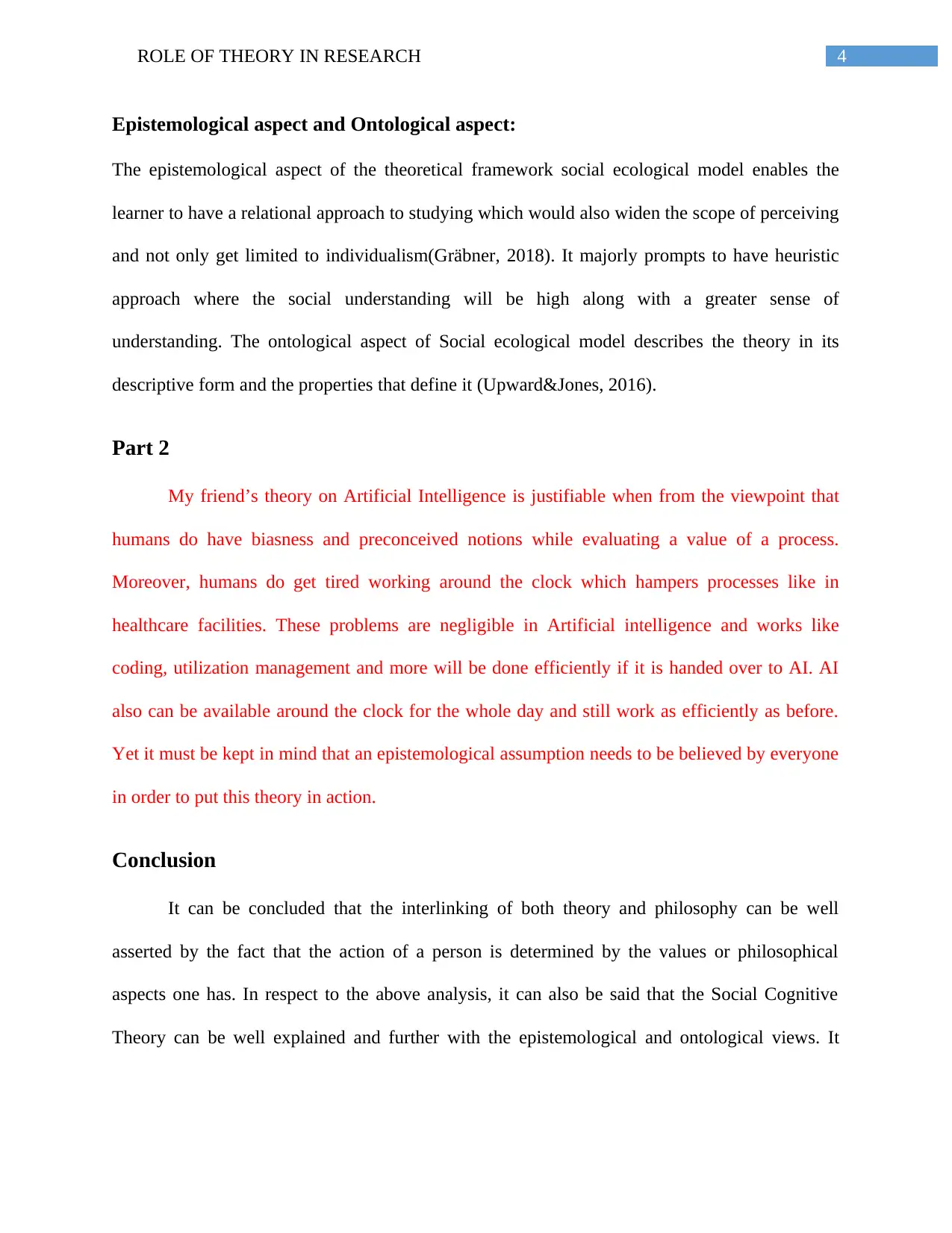
4ROLE OF THEORY IN RESEARCH
Epistemological aspect and Ontological aspect:
The epistemological aspect of the theoretical framework social ecological model enables the
learner to have a relational approach to studying which would also widen the scope of perceiving
and not only get limited to individualism(Gräbner, 2018). It majorly prompts to have heuristic
approach where the social understanding will be high along with a greater sense of
understanding. The ontological aspect of Social ecological model describes the theory in its
descriptive form and the properties that define it (Upward&Jones, 2016).
Part 2
My friend’s theory on Artificial Intelligence is justifiable when from the viewpoint that
humans do have biasness and preconceived notions while evaluating a value of a process.
Moreover, humans do get tired working around the clock which hampers processes like in
healthcare facilities. These problems are negligible in Artificial intelligence and works like
coding, utilization management and more will be done efficiently if it is handed over to AI. AI
also can be available around the clock for the whole day and still work as efficiently as before.
Yet it must be kept in mind that an epistemological assumption needs to be believed by everyone
in order to put this theory in action.
Conclusion
It can be concluded that the interlinking of both theory and philosophy can be well
asserted by the fact that the action of a person is determined by the values or philosophical
aspects one has. In respect to the above analysis, it can also be said that the Social Cognitive
Theory can be well explained and further with the epistemological and ontological views. It
Epistemological aspect and Ontological aspect:
The epistemological aspect of the theoretical framework social ecological model enables the
learner to have a relational approach to studying which would also widen the scope of perceiving
and not only get limited to individualism(Gräbner, 2018). It majorly prompts to have heuristic
approach where the social understanding will be high along with a greater sense of
understanding. The ontological aspect of Social ecological model describes the theory in its
descriptive form and the properties that define it (Upward&Jones, 2016).
Part 2
My friend’s theory on Artificial Intelligence is justifiable when from the viewpoint that
humans do have biasness and preconceived notions while evaluating a value of a process.
Moreover, humans do get tired working around the clock which hampers processes like in
healthcare facilities. These problems are negligible in Artificial intelligence and works like
coding, utilization management and more will be done efficiently if it is handed over to AI. AI
also can be available around the clock for the whole day and still work as efficiently as before.
Yet it must be kept in mind that an epistemological assumption needs to be believed by everyone
in order to put this theory in action.
Conclusion
It can be concluded that the interlinking of both theory and philosophy can be well
asserted by the fact that the action of a person is determined by the values or philosophical
aspects one has. In respect to the above analysis, it can also be said that the Social Cognitive
Theory can be well explained and further with the epistemological and ontological views. It

5ROLE OF THEORY IN RESEARCH
gives a substantial ground for exploring the various facets of the analysis of an individual even
though people have different perception about it.
gives a substantial ground for exploring the various facets of the analysis of an individual even
though people have different perception about it.
⊘ This is a preview!⊘
Do you want full access?
Subscribe today to unlock all pages.

Trusted by 1+ million students worldwide
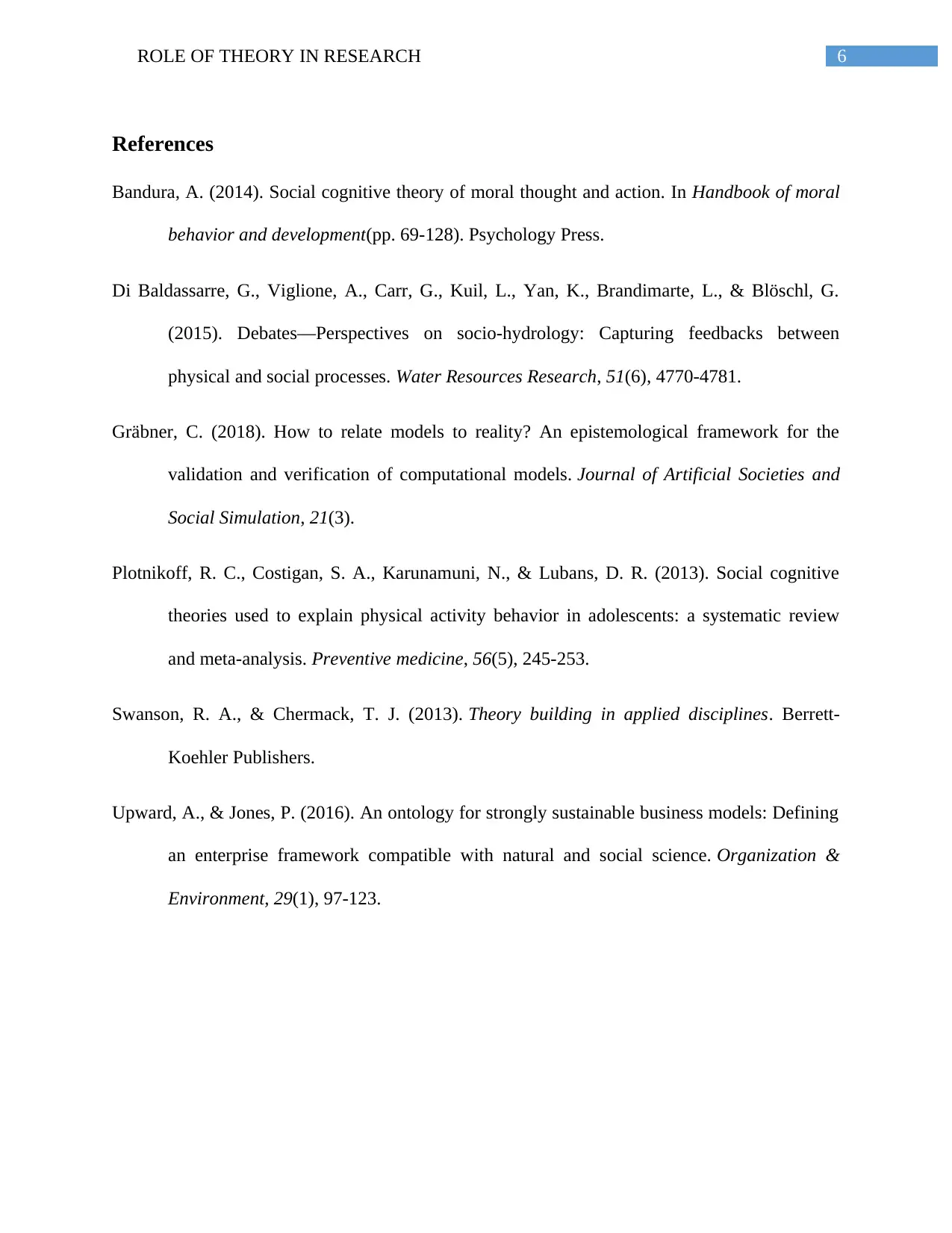
6ROLE OF THEORY IN RESEARCH
References
Bandura, A. (2014). Social cognitive theory of moral thought and action. In Handbook of moral
behavior and development(pp. 69-128). Psychology Press.
Di Baldassarre, G., Viglione, A., Carr, G., Kuil, L., Yan, K., Brandimarte, L., & Blöschl, G.
(2015). Debates—Perspectives on socio‐hydrology: Capturing feedbacks between
physical and social processes. Water Resources Research, 51(6), 4770-4781.
Gräbner, C. (2018). How to relate models to reality? An epistemological framework for the
validation and verification of computational models. Journal of Artificial Societies and
Social Simulation, 21(3).
Plotnikoff, R. C., Costigan, S. A., Karunamuni, N., & Lubans, D. R. (2013). Social cognitive
theories used to explain physical activity behavior in adolescents: a systematic review
and meta-analysis. Preventive medicine, 56(5), 245-253.
Swanson, R. A., & Chermack, T. J. (2013). Theory building in applied disciplines. Berrett-
Koehler Publishers.
Upward, A., & Jones, P. (2016). An ontology for strongly sustainable business models: Defining
an enterprise framework compatible with natural and social science. Organization &
Environment, 29(1), 97-123.
References
Bandura, A. (2014). Social cognitive theory of moral thought and action. In Handbook of moral
behavior and development(pp. 69-128). Psychology Press.
Di Baldassarre, G., Viglione, A., Carr, G., Kuil, L., Yan, K., Brandimarte, L., & Blöschl, G.
(2015). Debates—Perspectives on socio‐hydrology: Capturing feedbacks between
physical and social processes. Water Resources Research, 51(6), 4770-4781.
Gräbner, C. (2018). How to relate models to reality? An epistemological framework for the
validation and verification of computational models. Journal of Artificial Societies and
Social Simulation, 21(3).
Plotnikoff, R. C., Costigan, S. A., Karunamuni, N., & Lubans, D. R. (2013). Social cognitive
theories used to explain physical activity behavior in adolescents: a systematic review
and meta-analysis. Preventive medicine, 56(5), 245-253.
Swanson, R. A., & Chermack, T. J. (2013). Theory building in applied disciplines. Berrett-
Koehler Publishers.
Upward, A., & Jones, P. (2016). An ontology for strongly sustainable business models: Defining
an enterprise framework compatible with natural and social science. Organization &
Environment, 29(1), 97-123.
1 out of 7
Related Documents
Your All-in-One AI-Powered Toolkit for Academic Success.
+13062052269
info@desklib.com
Available 24*7 on WhatsApp / Email
![[object Object]](/_next/static/media/star-bottom.7253800d.svg)
Unlock your academic potential
Copyright © 2020–2025 A2Z Services. All Rights Reserved. Developed and managed by ZUCOL.




